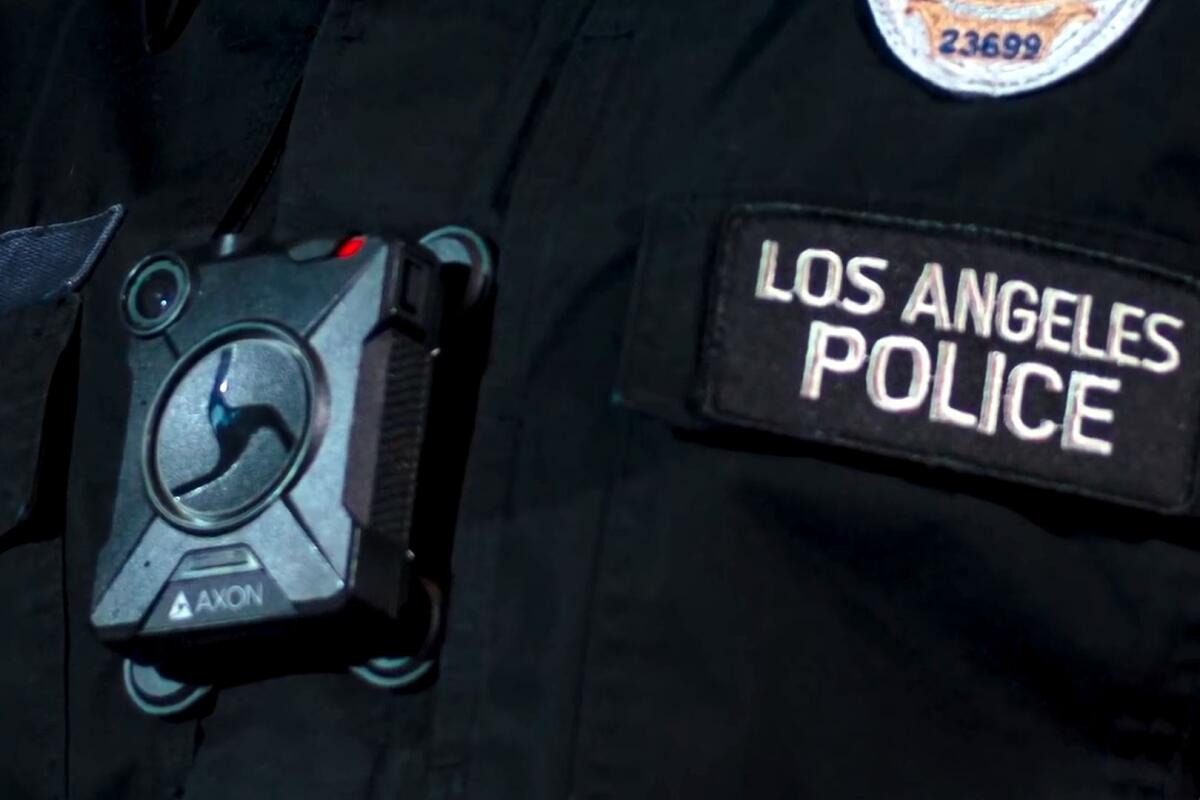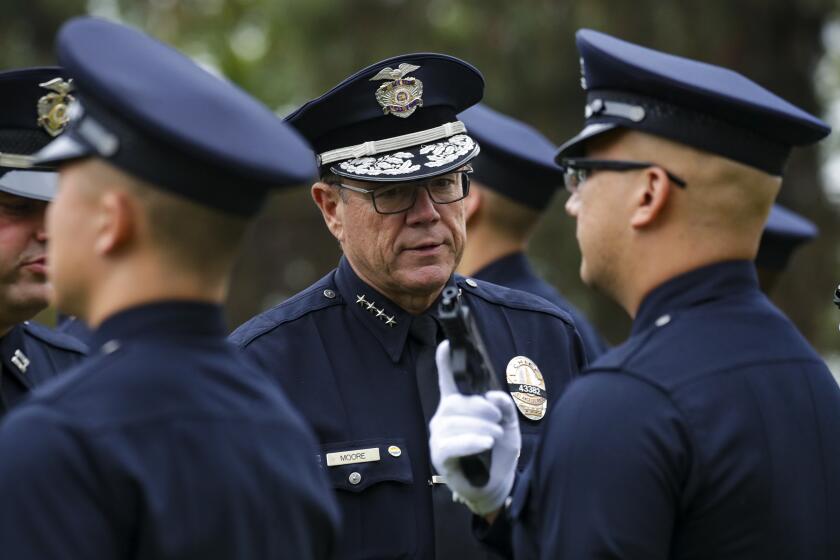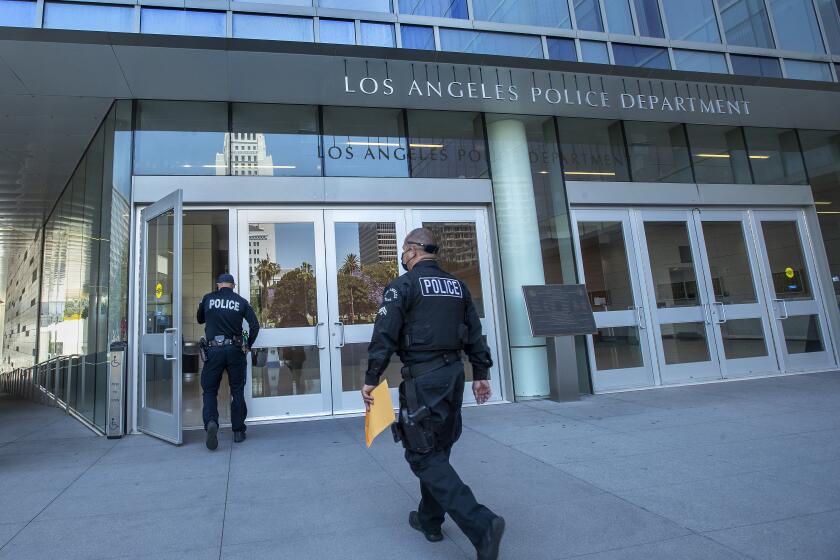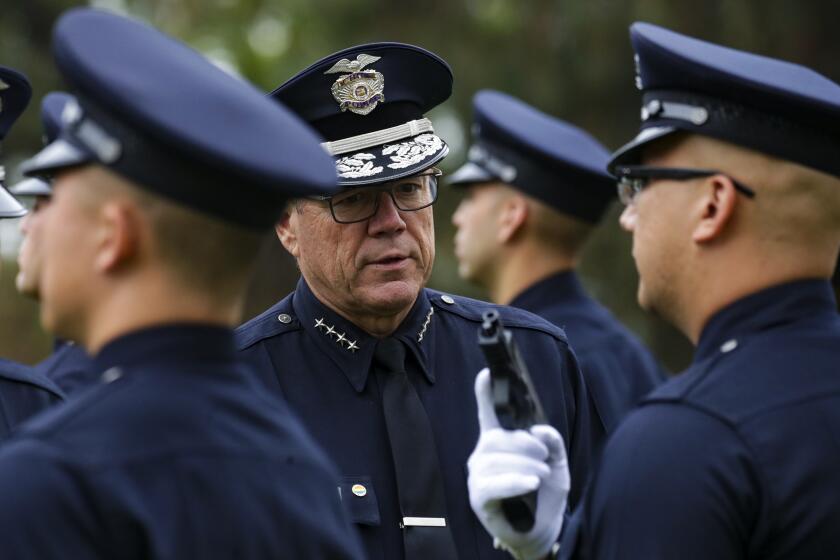LAPD considering stronger body camera policy in light of recent scandals

- Share via
The Los Angeles Police Department is considering changing department policy to increase random reviews of body camera recordings that don’t involve arrests or the use of force, according to an email from Chief Michel Moore to his senior staff.
Moore wrote that “it’s in our best interest to strengthen and reinforce” the number of incidents involving patrol and gang officers that are reviewed roughly every 30 days, “which more closely aligns with other agencies.”
“Additionally, I support expanding the incidents that qualify beyond those in which no enforcement action was taken,” Moore said in the Oct. 19 email, a copy of which was reviewed by The Times.
Internal LAPD reports indicate the problem of police officers flouting department body camera policy is more widespread than officials have been telling the public.
Moore’s directive comes months after revelations that members of a scandal-ridden gang unit were routinely turning off their body-worn cameras in violation of department policy. The ensuing controversy has spawned several investigations, including by the FBI, while also raising questions about whether the LAPD failed for years to develop clear policies on the camera issue despite earlier reports that they were a chronic problem.
The scope of the scandal is still unclear, but Mission Division gang unit officers have been accused of making illegal stops and theft, while failing to document some of their encounters with the public. The department is seeking to fire at least two of the involved officers, who are also facing criminal charges.
Moore said he is working on an agreement with the Los Angeles Police Protective League, the union that represents rank-and-file officers, to activate a feature that would allow the department to “recover” up to 18 hours of footage.
Such a time frame far exceeds the so-called buffer built into the current cameras. Now, when body cameras are powered on, they are constantly recording a two-minute loop that is saved when officers activate their cameras. This allows officers to capture footage without audio of what occurred in the two minutes before they activate their cameras, a necessary feature, department officials say, given that some uses of force occur in situations that develop quickly.
This, Moore wrote, could help shed light on a serious incident such as an officer being “seriously wounded or killed with little to no information for the Department to pursue.”
“I’m interested in ‘activating that feature under a very tight set of controls,” he wrote, saying it could allow investigators to “identify key” evidence.
While the feature could theoretically be turned on today, it would require a sign off from the Protective League, which negotiated the current two-minute buffer.
Los Angeles police have created an internal task force to investigate alleged misconduct by a San Fernando Valley gang unit.
“These revisions are a priority. Please begin immediately and I look forward to regular updates,” Moore wrote in the email to senior staff. He asked Liz Rhodes, the LAPD’s constitutional policing director, to connect with police union president Craig Lally “what we are finding with other agencies’ access, inspection, audits and review practices in regards to BWV [body-worn video] captures.”
The League said it negotiated changes to camera guidelines in its latest contract, approved in August, which also provides raises and bonuses for the rank-and-file. The “significant changes” are intended to “protect the men and women who have been subjected to the morale-buster, gotcha-era of the Body Camera,” union board member Debbie Thomas wrote in a recent edition of the League’s monthly magazine, Thin Blue Line.
Under the new contract, the department cannot pursue a complaint against an officer for minor misconduct, such as the use of profanity, discovered during a body camera audit unless “the progressive discipline model has been exhausted,” Thomas wrote.
The same goes for lesser wrongdoing that is discovered during the inspection of video in connection to any investigation related to a pursuit, civilian complaint or use-of-force incident, she wrote.
“The days of you using profanity during a tactical situation or, God forbid, forgetting to put on your seat belt for 1.5 seconds and somehow ending up with a complaint, now have guidelines that command SHALL follow,” Thomas wrote.
Moore said in his staff email that the information technology bureau is in the midst of a broader modernization of the department’s computer systems and is “working closely” with camera manufacturer Axion “to understand what else can be done to improve the accountability of ensuring officers are using BWV as required.”
In 2019, the department also announced it was stepping up random body camera audits as part of an effort to investigate complaints of biased policing during traffic and pedestrian stops.
Even as the use of the devices expanded across the country, citizens and many police leaders said they brought much-needed transparency to police encounters with the public — well worth the millions they cost to purchase and maintain. Critics say the devices have failed to produce better behavior.
Auditors from the four geographic bureaus perform spot checks roughly every four weeks by randomly reviewing eight gang unit stops “that don’t result in enforcement action.” Supervisors are supposed to ensure that officers’ reports reflect what’s captured by their cameras and look for potential red flags, including canned language in reports, overreliance on a single confidential informant in multiple investigations and a high percentage of stops labeled as consensual.
The department has stepped up such reviews in the wake of the scandal. Moore has said that the audits confirm that the majority of officers act properly during public encounters.
Before the Mission scandal broke, the LAPD announced it was partnering with academic researchers to use artificial intelligence to study how officers speak to the public. But department officials have signaled the findings would be used solely for training purposes — to ensure, for instance, that officers aren’t rude and that they explain their actions when stopping people. That means misconduct uncovered would be unlikely to lead to discipline.
LAPD will use artificial intelligence to analyze body camera video as part of a broader study of whether officers’ language escalates public encounters.
Although department leaders have insisted publicly that the problems identified in Mission were confined to a single division, an internal report found that the body camera issue is likely more widespread than officials were letting on.
The confidential report pointed to lapses in the 77th Street, Hollenbeck and Hollywood divisions.
One possible explanation for these lapses, the report says, is a “real perception” that exists among many officers that they are “somehow excused” from turning on their cameras in time to capture encounters with the public, so long as they can articulate a clear reason for not doing so.
Such lapses were not counted in monthly audits, allowing the department to maintain near-perfect rates of compliance, the report’s authors said. At the same time, some supervisors are under the impression that they are only required to review recordings from arrests, when force is used or in cases in which the public files complaints against officers, and that most reviews are “the responsibility of the Bureau Inspections Units or teams,” the report said.
The FBI has joined an investigation of several Los Angeles Police Department gang officers who are suspected of questionable tactics during traffic stops.
LAPD rules don’t explicitly require supervisors to check body camera footage after they find a “deviation in the comments of [an officer’s] report,” and until recently, the report said, the department’s computer system couldn’t track whether such a review had been done.
The report said the department should consider studying the “feasibility” of adding to the workload of patrol supervisors, who are already tasked with the “voluminous work of reviewing [videos] ... for Use of Force and Pursuit Investigations and Complaint Intakes.”
Moore issued a directive earlier this month, clarifying that supervisors had the authority to review their officers’ videos in many cases.
At a news briefing Tuesday, Moore said the current camera policy is strong, but he admitted to some confusion about the role of supervisors in reviewing footage.
“I recognize as we surveyed and spoke with command officers and others, that they believed differently because of the nature of our inspection procession,” he said.
“The codification of that, in their view, suggested that that was the only means in which they could have access to body worn video outside of an arrest or categorical use of force or a pursuit,” he said, “so I wanted to clarify that.”
More to Read
Sign up for Essential California
The most important California stories and recommendations in your inbox every morning.
You may occasionally receive promotional content from the Los Angeles Times.


















